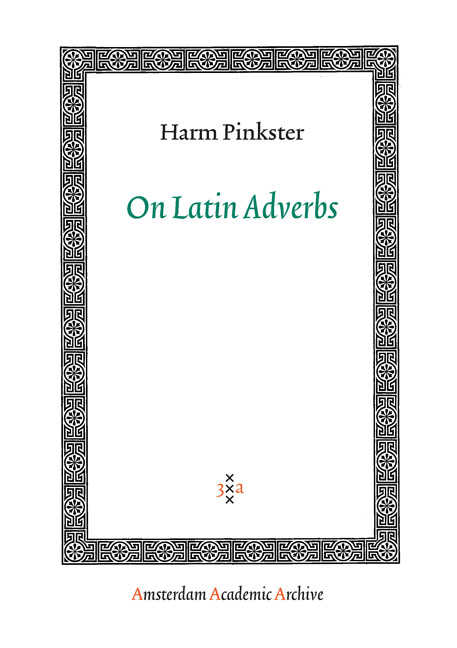Book contents
- Frontmatter
- Preface to this Edition
- Preface
- Contents
- Introduction
- 1 General Problems of Studying a Dead Language
- 2 Problems of Classification
- 3 Adverbs in Roman Grammatical Theory
- 4 The Adverb in Latin Linguistics
- 5 Adverbs as Derived Forms
- 6 Syntactic Problems
- 7 Subclassification of Adverbs
- 8 Adverbs and other Invariables
- 9 The Relationship Between Adverbs and Prepositions
- 10 Adverbs and Connectors
- 11 Adverbs and Subordinators
- Bibliography
- Indices
- Index Auctorum
- Titles Published in the Aaa Series
4 - The Adverb in Latin Linguistics
Published online by Cambridge University Press: 24 January 2021
- Frontmatter
- Preface to this Edition
- Preface
- Contents
- Introduction
- 1 General Problems of Studying a Dead Language
- 2 Problems of Classification
- 3 Adverbs in Roman Grammatical Theory
- 4 The Adverb in Latin Linguistics
- 5 Adverbs as Derived Forms
- 6 Syntactic Problems
- 7 Subclassification of Adverbs
- 8 Adverbs and other Invariables
- 9 The Relationship Between Adverbs and Prepositions
- 10 Adverbs and Connectors
- 11 Adverbs and Subordinators
- Bibliography
- Indices
- Index Auctorum
- Titles Published in the Aaa Series
Summary
If one comRares the definition of the adverb given by Priscian and other Roman grammarians (viz.: the adverb is an invariable word, the meaning of which is added to that of the verb just as the meaning of the adjective is added to that of the noun) with the usual definition in modern Latin grammars - as well as with grammars of modern languages - the main difference turns out to be that nowadays adverbs are said to modify adjectives and other adverbs as well.
Most words which are now called adverbs were considered adverbs by Roman grammarians. The overall impression is still one of heterogeneity (L6fstedt 1967: 79; Marouzeau 1949: 11; Booth 1923: IX). The adapted definition is not sufficient to cover the characteristics of these words.
I will examine what modern grammarians have to say about the adverb as far as morphology and phonology, semantics and syntax are concerned. On morphology, I will remark that the classification needs no revision. What is problematic is only the meaning of the term ‘invariable'. This term will be discussed in ch. 5. The semantic subclassification, which is in fact the only subclassification given, will appear to be rather unsatisfactory, especially with respect to so-called manner adverbs. The syntactic remarks, finally, if understood as a system of generative rules will be shown to produce various types of incorrect utterances and not to produce certain correct ones. In the discussion about syntax the notion of modification will be accepted as such. A further analysis of this will follow in ch. 6.
Morphology and phonology
The adverb is an invariable word (Szantyr: 170; Kiihner-Holzweissig 1912: 255 (using the term ‘unflektierbar’); Ernout-Thomas 1959: 1; Blatt 1952: 33, etc.). This characteristic is one it shares with words belonging to other categories, such as prepositions, conjunctions, interjections. For example, Szantyr (: 170) mentions prepositions and particles (see ch. 8, n.2.) as other classes of invariable words. As in ancient Roman grammar it seems feasible to speak of ‘comparison of adverbs’ (expressions like: ‘altissime is the superlative of alte; diutius the comparative of diu’), which suggests that by ‘invariable’ is still understood ‘uninflected for Case, Gender and Number'. Degree of comparison is apparently not considered an inflectional category. This question will be discussed in some detail in the next chapter. I only mention one exception, viz. Bos (1967: 107), in whose opinion degrees of comparison form ‘a system of inflectional categories'.
- Type
- Chapter
- Information
- On Latin Adverbs , pp. 45 - 62Publisher: Amsterdam University PressPrint publication year: 2005



